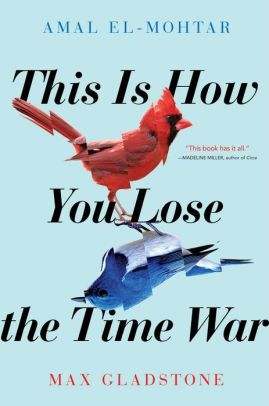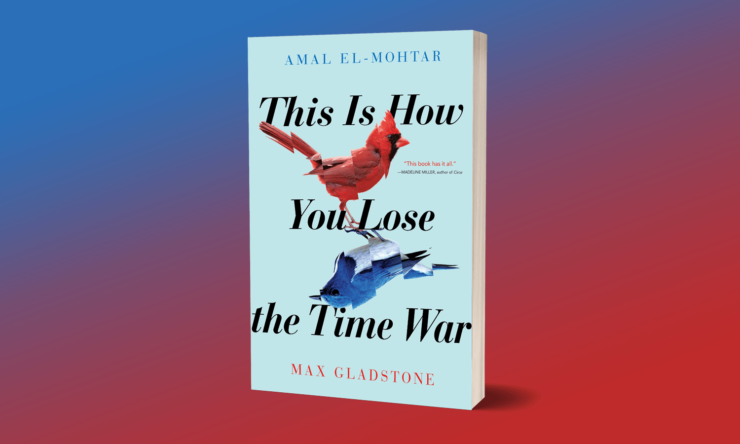Two far-flung future societies—called Garden and the Agency, respectively—toe through timelines seeding potential, nudging some lives forward and decimating others, with the ultimate goal of preserving their own existence as the inevitable outcome of human culture. As elite agents for their opposing sides, Red and Blue bite at each other’s heels across time and space through dying worlds, long cons, strange pasts and stranger futures. One chance outreach between them, forbidden but irresistible, forges a connection neither could’ve anticipated. Impossible letters wait through centuries for discovery as the pair of them communicate about their goals, their missions, their shared distastes and pleasures—taboo informational liaisons that lead to far more.
One the one hand, This Is How You Lose the Time War is about that titular war: the protagonists are agents undertaking missions to stabilize (or destroy) certain strands in time to benefit their own potential future. On the other, the novella isn’t about the war at all as more than an object lesson, a conceit, the unending and reason-less conflict that consumes generations, centuries, now and forever. And in place of a story about that bigger-than-big conflict, about winning or losing, El-Mohtar and Gladstone weave a romance through letters.
This Is How You Lose the Time War has a poetic internal structure: the image and the turn, an affective center of motion that occurs within the characters and the reader rather than entirely within a narrative arc. I wouldn’t call the prose lush; in fact it’s quite sharp, almost crisp, in its deployment of metaphor and comparative language as well as its dialogue. The epistolary sections are at turns provocative and sensual, tender and cutting (take the shifting nicknames alone!). While there obviously is a larger world outside of the letters, a war to manipulate timelines with one side technological and the other biological, the focus remains on the personal as opposed to the global.
Buy the Book


This Is How You Lose The Time War
As a result, the space of external conflict where most narratives would occur remains in soft focus as the novella privileges its romance, the contracting and expanding pulse of intimate connection within a system that wishes to prevent it. El-Mohtar and Gladstone have created a tale of star-crossed lovers on an epic scale, truly across time and physical boundaries. Their letters are as sweeping as the timelines between them, frequently meta-textual and intensely flirtatious, wide-ranging in the way that correspondence between people who really fit each other can be. That these lovers are women-soldiers adds a certain flair to the experience, as well, given the world queer folks exist within in our time. Forever wars and hegemonic violence and the prevention of intimacies between women do indeed all seem prescient to our moment.
(Spoilers follow.)
However, that epistolary/poetic structural combination doesn’t mean there isn’t also narrative action on the page. It is, after all, a romance in the truest sense of the word. The closing quarter of the novella, where the time-heist-esque maneuvering between Blue and Red comes to a climactic point, kicks the slow chase of their blossoming passion into the realm of the war that’s been occurring as almost-backdrop throughout. Red’s command discovers the pattern of her interactions with Blue and seeks to manipulate it; she cannot resist without revealing her own defection and therefore must turn her wiles against her lover while attempting to preserve her at the same time.
That plot hinge forces their idyllic competition as opposite forces to shift into a team effort at survival, rearranging the logics of war and provoking their desire to create a fresh world for themselves. Both must concede to allow the other access to their most intimate selves to cement their bond—and that access is literalized through the story itself, where they’ve always-already manipulated each other’s pasts without knowing. Deflection and misdirection might forge an initial interest but honest connection solidifies a longterm relationship, to put it mildly. While the ending itself leaves the door open (will their escape together be successful, will they thrive, will their rejection of the entire system be possible?), it does so with utmost hope and potentiality on the table.
This Is How You Lose the Time War has an argument to make—several, actually—about conflict, love, and resistance. The closing lines paired with the title create a fantastic turn:
But maybe this is how we win, Red.
You and me.
This is how we win.
To lose the war is, by implication, desirable if losing means stepping aside from the conflict rather than holding tenaciously to the goal of besting one another. Though competition drew Blue and Red together in the first place, a relationship has to evolve past competition into support to survive. Within the narrative structure, also, Gladstone and El-Mohtar’s resistance to focusing on the war in favor of focusing on the agents of war twists expectation. The simultaneous rejection and centering of continual conflict is something I’d like to think further on in future readings of the text, because This is How You Lose the Time War is the kind of handsome, charged novella that rewards repeated close reading.
The imagery that supports the sweep of the narrative is striking, too, from the smallest unexpected phrase like “burn before reading” to the lyrical, mythic symbol of cracking seeds between one’s teeth to extract a lovers’ message. The book is worth keeping between one’s own teeth for a little while, savoring the flips and pulls of the poetic alongside the narrative plot. Plus, the clever flirtations of Blue and Red’s letters are a delight in an almost voyeuristic way. We get to watch as needling evolves to playful teasing, compliments, increasingly erotic or sensual names and turns of phrase. It’s in these moments that the intense care El-Mohtar and Gladstone put into their own use of language becomes clearest. The novella manages to be broadly romantic while also maintaining a hideous cruelty in its approach to violence, weaving those strands of emotion together seamlessly. The end result is gorgeous and honestly unexpected—a different flavor that I suspect we all need in our sf-nal worlds from time to time.
This Is How You Lose the Time War is available from Simon & Schuster.
Lee Mandelo is a writer, critic, and editor whose primary fields of interest are speculative fiction and queer literature, especially when the two coincide. They have two books out, Beyond Binary: Genderqueer and Sexually Fluid Speculative Fiction and We Wuz Pushed: On Joanna Russ and Radical Truth-telling, and in the past have edited for publications like Strange Horizons Magazine. Other work has been featured in magazines such as Stone Telling, Clarkesworld, Apex, and Ideomancer.










